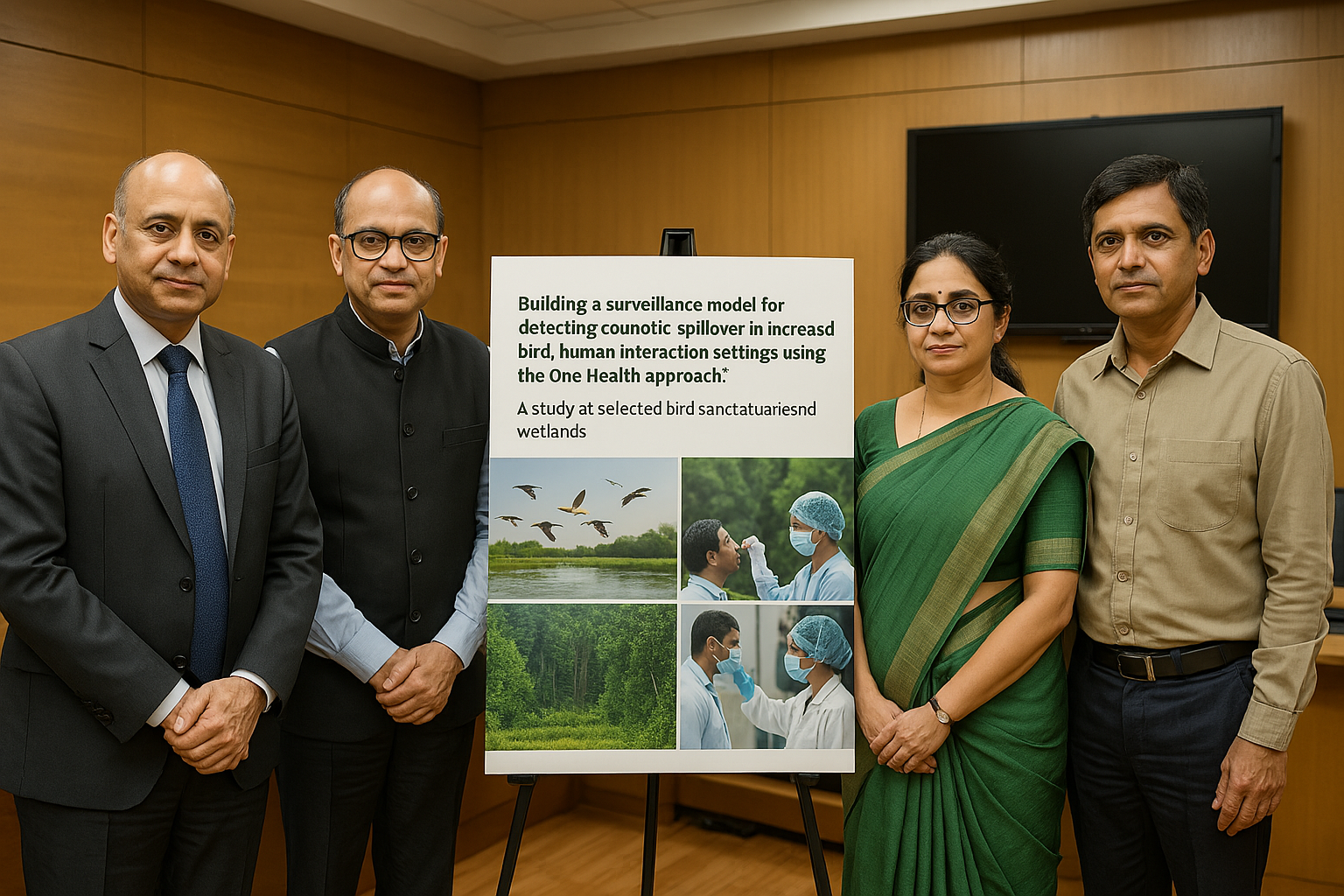India Launches Study to Detect Zoonotic Diseases with One Health Approach
The study marks a significant step towards strengthening India’s early warning systems for public health threats posed by zoonotic diseases.

- Country:
- India
In a groundbreaking initiative, India has embarked on a comprehensive, inter-ministerial scientific study focused on detecting zoonotic diseases that could potentially spill over from birds to humans. This pioneering project, titled “Building a surveillance model for detecting zoonotic spillover in increased bird-human interaction settings using the One Health approach: A study at selected bird sanctuaries and wetlands,” was officially launched at the Indian Council of Medical Research (ICMR) Headquarters. The study marks a significant step towards strengthening India’s early warning systems for public health threats posed by zoonotic diseases.
The project, which spans multiple states across the country, will focus on high-risk regions, including select bird sanctuaries and wetlands in Sikkim, Maharashtra, and Tamil Nadu. The study will leverage the innovative One Health approach, a multidisciplinary framework that recognizes the connection between human, animal, and environmental health. By integrating the health of migratory bird species, human populations, and the ecosystems in which they interact, the study aims to create a robust surveillance system that can detect and respond to emerging health threats in real-time.
A Collaborative Effort Across Ministries
The initiative brings together a wide range of stakeholders from various scientific and governmental sectors, showcasing India’s commitment to a coordinated, cross-disciplinary approach to public health. Key players include the Ministry of Environment, Forest and Climate Change (MoEFCC), the Ministry of Health and Family Welfare, and the Ministry of Agriculture, alongside the ICMR and the National Centre for Disease Control (NCDC).
On the occasion of the study’s launch, Dr. Rajiv Bahl, Director General of the ICMR and Secretary of the Department of Health Research (DHR), emphasized the importance of a strong surveillance system in the fight against emerging health threats. “Just as a strong radar system is essential for timely and precise action, robust surveillance systems are critical for early detection and containment of emerging health threats. By embracing the One Health approach, we are shifting from reactive responses to proactive preparedness—an urgent global necessity,” he said.
Dr. Ranjan Das, Director of the NCDC, echoed this sentiment, highlighting the need to understand the mechanisms and drivers behind zoonotic spillovers. “This vital initiative aligns with our national strategy to detect, prevent, and respond to zoonotic threats. Strengthening surveillance at the human-animal-environment interface will significantly enhance India’s preparedness for future outbreaks,” Dr. Das added.
Addressing the Threat of Zoonotic Diseases in Bird Sanctuaries
India's position along the Central Asian migratory bird flyway makes it a vital hub for migratory bird species. Bird sanctuaries, therefore, serve as critical intersections where the risk of zoonotic disease transmission is heightened. Workers in these sanctuaries, including wildlife rescue teams, veterinarians, and local communities, are particularly vulnerable due to their close interaction with both wild and migratory birds.
The study will target these high-risk areas by developing a surveillance system that can monitor the health of both sanctuary workers and surrounding populations. The goal is to identify emerging pathogens through periodic sampling of birds and environmental specimens. Advanced diagnostic technologies, including Next Generation Sequencing (NGS), will be employed to quickly identify novel infections and enable early intervention.
A Comprehensive Approach to Public Health and Biodiversity
This initiative is not just about detecting disease but also about fostering a deeper understanding of the delicate balance between biodiversity conservation and public health. The role of the Ministry of Environment, Forest and Climate Change (MoEFCC) in the project underscores the importance of wildlife and ecosystem health in protecting human well-being. According to Mr. Sunil Sharma, Assistant Inspector General of Forests at the MoEFCC, “This collaborative effort reinforces our commitment to conserving biodiversity while protecting communities from emerging health risks.”
The study aligns with the National One Health Mission (NOHM), a key component of India’s broader strategy to address global health challenges at the intersection of human, animal, and environmental health. Dr. Sangeeta Aggarwal, Scientist F at the Office of the Principal Scientific Adviser to the Government of India, emphasized that such inter-ministerial collaborations are crucial for translating scientific research into actionable policy. "This is a pioneering example of inter-ministerial cooperation on scientific surveillance, essential for resilient health systems,” she said.
Strengthening India’s Preparedness for Future Outbreaks
The findings from this comprehensive research project will play a critical role in enhancing India’s preparedness for future zoonotic disease outbreaks. By establishing a real-time surveillance model, the study aims to become India’s first early warning system for zoonotic spillovers, allowing for quicker identification and response to potential threats.
The project is a crucial step in building a more resilient health system, one that is capable of responding not only to known diseases but also to emerging threats that may arise in the future. With its integrated approach to wildlife health, environmental science, and human health, this initiative serves as a model for other countries grappling with the growing risks posed by zoonotic diseases. It represents a significant leap forward in safeguarding public and environmental health across India.
This innovative study underscores the importance of proactive health strategies and sets a precedent for inter-disciplinary and inter-ministerial collaboration in the face of evolving global health challenges.
- READ MORE ON:
- Indian Council of Medical Research
- zoonotic diseases










